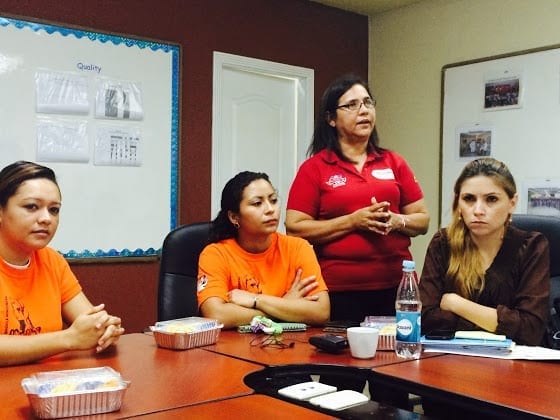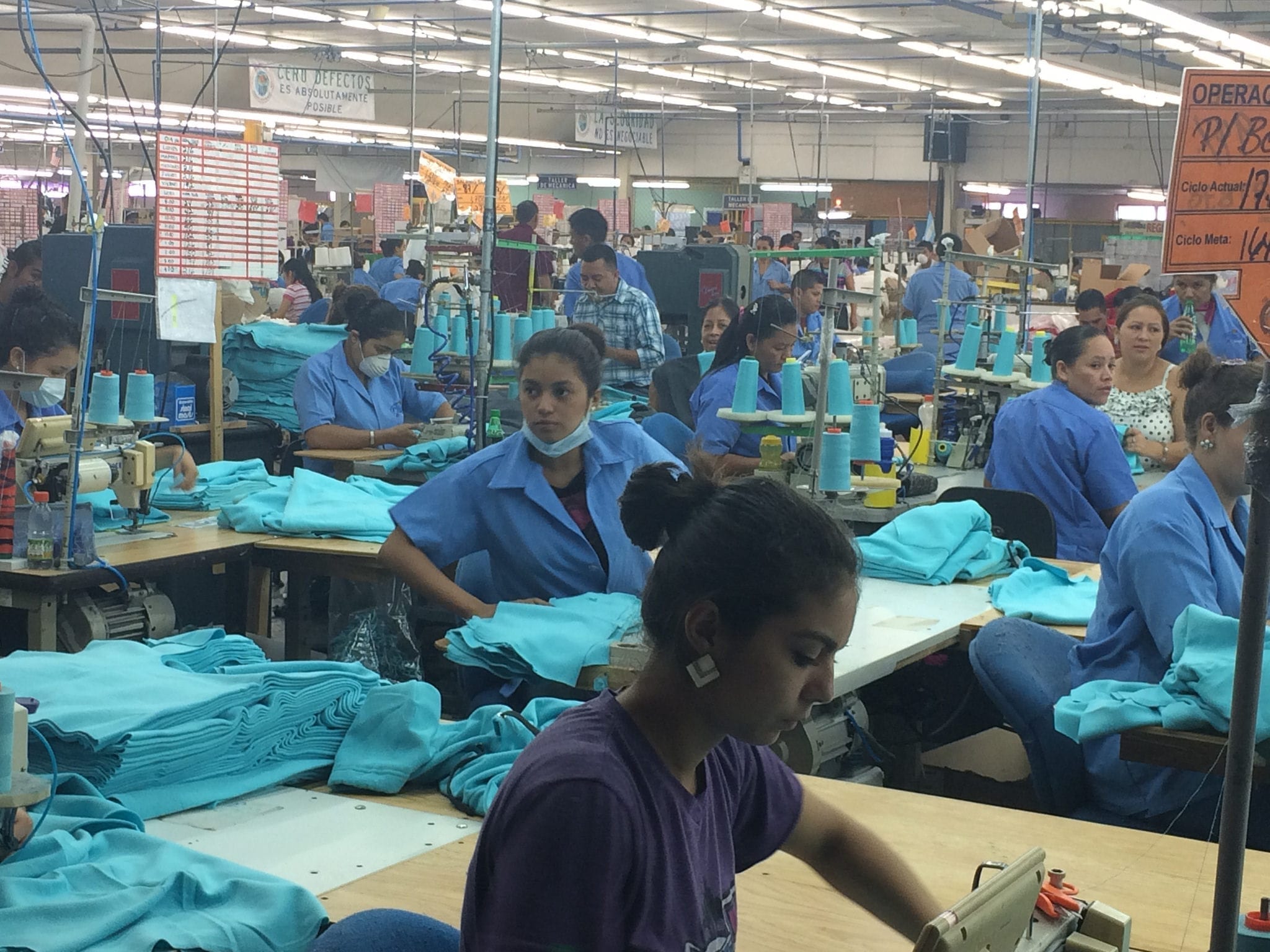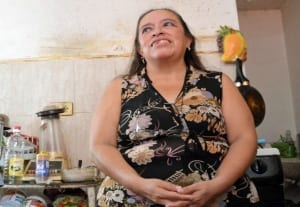
Nov 9, 2017
In Honduras, union leaders are on their way to successfully negotiating eight collective bargaining agreements covering 21,000 garment workers who have joined unions in the past few years. Contracts negotiated so far include 23 percent wage increases, free transportation to and from work, free lunch, additional severance pay for workers recovering from ergonomic-related illnesses, and educational funds for workers and their children.
Five of those agreements will be first-ever pacts for 17,350 workers, says Evangelina Argüeta Chinchilla, coordinator of organizing maquila workers in the northern Choloma region for the General Workers Central (CGT) union confederation.
Argüeta Chinchilla, whose efforts to improve factory workplaces and whose training among women garment workers is enabling them to take leading roles in their unions and communities, will be honored along with the Honduran union movement November 15 at the Solidarity Center 20th Anniversary celebration in Washington, D.C.
The evening event features AFL-CIO Secretary-Treasurer Liz Shuler and also will honor U.S. Sen. Sherrod Brown for his leadership to protect worker rights and the brave Colombian union and community activists for their frontline-efforts to achieve social justice in their country. And special guest U.S. Rep. Karen Bass will deliver remarks. (There’s still time to sponsor the event or buy tickets to attend!)
The day begins with a launch of the Solidarity Center-support book, Informal Workers and Collective Action: A Global Perspective, and panel discussions featuring U.S. Rep. Pramila Jayapal and international worker rights activists. (Find out more about the free book event and RSVP here.)
Honduran Unions ‘Persevere on Behalf of Workers and Their Families’
In a country where in recent years union leaders have been harassed, attacked and even murdered, and where employers utilize hardball tactics to prevent workers from forming unions and bargaining contracts, the stunning success of the garment workers in achieving fundamental workplace rights is a “testament to the determination of the Honduran union movement to persevere on behalf of workers and their families,” says Solidarity Center Executive Director Shawna Bader-Blau. “Together, they are helping to ensure that workers have living wages, just and fair workplaces and the opportunity to improve the future of their children.”
Argüeta Chinchilla is emblematic of these dedicated activists. She began work in a maquila at age 15, where she toiled for nine years and was a founder of the union at her factory before becoming a full-time organizer for the CGT. With Argueta’s leadership, Honduran garment-sector unions have negotiated historic worker rights agreements with two major U.S. clothing brands, Fruit of the Loom (2009) and Nike (2010), that laid the groundwork for successive organizing and collective bargaining achievements.
She and other women unionists hold leadership trainings with assistance from women’s rights organizations and the Solidarity Center. Argüeta Chinchilla hopes to see women “exercising power proportional to the numbers we represent in the world, in the labor movement.”
Empowered women now ensure their concerns are reflected in bargaining agreements. Some of the contracts garment workers have negotiated so far grant women who have just given birth additional paid leave beyond the 12-week maternity leave they receive under Honduran law.
“This is important, because a lot of times women workers must resign because they don’t have anyone to take care of their baby, especially in the early weeks, and this will help them get through that period,” says Argüeta Chinchilla, speaking through a translator.
Expanding Democracy Through the Freedom to Form Unions
International solidarity with Honduran workers has been key to furthering their efforts to achieve decent jobs. In November 2009, Russell Athletic agreed to rehire 1,200 workers in Honduras who lost their jobs when the company closed the factory in an attempt to bust the union, after the union—with support from the Solidarity Center and the United Students Against Sweatshops—convinced 110 U.S. universities to cut their apparel contracts with Russell.
Since then, says Argüeta Chinchilla, “it is very evident that significant protections have been made—workers are more educated about their rights, there is more respect for freedom of association and collective bargaining, and improvements such as health and safety for workers.
“There is always the fear of losing your job, but less now than what happened in past.”
Earlier this year, a four-year campaign by Honduran labor unions to improve workplaces and strengthen the rights of workers culminated with the Honduran National Congress approving a new labor inspection law. The law promotes, monitors and is designed to ensure that workplace standards, safety and health provisions, and social security requirements are upheld. It includes financial penalties for violations of worker rights, including the right to form unions.
Argüeta Chinchilla knows that such success begins through empowering workers, especially women workers, to take active roles in their unions.
“The internal democracy of unions has improved,” says Argüeta Chinchilla. “Many more women are active in union leadership, and this has translated into civil society: Workers are more participative in democracy and government and the country in general.”

Jun 15, 2015
Apparel workers in Honduras formed unions at three factories in recent days with the Central General de Trabajadores Honduras (CGT) and its apparel federation FESITRATEMASH, in a huge victory for workers seeking to improve their basic livelihoods.
Some 9,000 workers at the Canadian-owned Gildan apparel factories in Choloma, San Pedro Sula and Villanueva make T-shirts, sweatshirts and sweatpants. Gildan recently surpassed Fruit of the Loom as Honduras’s largest private-sector employer.
“With the organization of these unions we the workers now have a voice on the job and a mechanism to negotiate over the conditions of work at Gildan,” says Nahun Rodriguez, President of the SITRAGAVSA union at Gildan Villanueva.
Meanwhile, apparel workers at a Fruit of the Loom factory in Villanueva, Honduras, and their CGT-affiliated union SITRAMAVI last week negotiated a first collective bargaining agreement covering 1,200 workers. The workers cut and sew T-shirts and sweatshirts.
The union organizing at the Gildan factories further expands the membership of CGT and FESITRATEMASH, which represent workers at four Fruit of the Loom factories, and is a significant step forward for apparel workers employed by major multinational apparel brands in the country’s export processing zones.
Honduran labor laws meant to protect workers from the health and safety risks posed by textile factory work are rarely enforced, and there is a severe shortage of factory inspectors who can investigate the working conditions of the hundreds of maquilas—many of them sweatshops.
The majority of clothing and textile workers are women who face particular challenges in the workplace, including sexual harassment, denial of maternity leave and forced pregnancy tests during the job application process. Last fall, a Solidarity Center delegation to Honduras found the level of rights violations, repression of activists and economic hardship experienced by millions of workers “overwhelming.”
The recent victories build on years of Solidarity Center training with CGT, including education on workers’ legal rights, fundamental union principles and union organizing. The Solidarity Center also has trained and mentored organizers who conduct worker outreach to further educate workers on their rights, build organizing committees and seek legal registration of unions.
In 2009, CGT represented one apparel union that was nearly disbanded when Fruit of the Loom shut down the factory to avoid bargaining with workers. As part of an internationally backed campaign, the union reached an historic agreement with Fruit of the Loom to reopen the factory, hire back the workers, provide a welfare fund for the workers for the year they were unemployed, recognition of the union and the negotiation of a collective bargaining agreement.
From that victory, the CGT has now has organized workers at nine more factories, and negotiated collective bargaining agreements at six of them. Nine of the 10 are apparel factories and one is an automobile parts manufacturer.
The Solidarity Center also has provided CGT with legal aid to help workers obtain more than $1.7 million of back wages at three factories that closed without paying workers their wages.
Also as part of the multi-year strategy developed with CGT, the Solidarity Center supported CGT in negotiations with employers and the government, achieving a national-level agreement among labor, business and the government that includes providing housing for apparel workers and daycare centers for apparel workers’ children.

Mar 6, 2015

Tonantzin Nava: “As women, we must raise our voices and keep pushing for better opportunities for all of us.”
At an auto parts factory in Piedras Negras, Mexico, women getting off work after midnight board private buses the company pays for to transport them home. But until recently, the bus drivers refused to take the women all the way to their houses, instead letting them off far from their residences and forcing them to walk alone in one of Mexico’s most unsafe areas, especially for women. (El articulo en español aquÍ.)
All that changed after the women joined together and circulated a petition asking their employer to require the bus drivers to take them to their houses, which they now do.
“To me this was important not only because now we can say to our kids that we’ll be back from work safe at night, but also because more women in our neighborhoods will consider working at the factories,” says one worker, Tonantzin Nava. “As women, we must raise our voices and keep pushing for better opportunities for all of us, and to ensure that our jobs provide for our safety.”
The women workers recognized they have the power to stand up for their safety after participating in the Gender and Women’s Empowerment for Action (GEMA) training, a program sponsored by the Solidarity Center and the Border Committee of Women Workers (Comité Fronterizo de Obrer@s, CFO).
Launched in 2013, GEMA (“gemstone” in Spanish), is unique because women workers are at its center. It was designed by and for women workers in the maquilas of Mexico’s northern border, and the workers guide the program facilitators in the types of training, analysis and planning most appropriate and useful for them. GEMA participants tell facilitators they want formal-sector jobs, but with decent working conditions. If maquila jobs—where women predominate—are not decent jobs, they perpetuate gender-based discrimination and violence and do not help families and their communities.
Economic hardship contributes to the daily potential for physical danger, and accentuates the risks that women in particular face. The GEMA program helps women analyze these issues and develop plans of action to address them.
In border areas like Piedras Negras, women make around $1 per hour in the maquiladoras, and most face unsafe and unhealthy conditions in an environment where labor laws are typically not enforced. Chronic injuries such as carpel tunnel and circulation problems from long hours of backbreaking and repetitive work are the norm, yet access to health care and workers’ compensation is sporadic.
Piedras Negras, in Coahuila state, across from Eagle Pass, Texas, is in the heart of northeastern Mexico, where the number of women murdered jumped more than 500 percent between 2001 and 2010. While the cause of these deaths varies, the deterioration of the social fabric, which has enabled such violence to surge unimpeded, stems in large part from the economic marginalization of women and their families.
Across Mexico, some 4,000 women disappeared in 2011–2012, part of a pandemic of violence against women at a time when 10 million workers were unable to provide the basic needs of their families, and when the number of women entering precarious jobs grew faster than the rate at which they were entering well-paid formal sector jobs.
To reach and empower as many women as possible, GEMA participants go on to share their insights and training with other women, meeting with them in their homes, where these “safe” environments provide them the social space to get to know one another and develop bonds of solidarity, figure out their most pressing problems and devise courses of action to address them. The women say GEMA gives them the tools to rebuild the social fabric of their communities.
“In GEMA, we have developed our self-confidence as well as skills and talents that we didn´t even know we had,” says Yohanna Esparza. “I am now facilitating discussion groups with other women and we are starting to walk steadfastly together, with our heads held high, on the path toward our dreams of a better future.”
Other women who have taken part in GEMA have gone on to participate in weekly roundtable meetings with management at an auto parts factory, to channel concerns and develop solutions.
GEMA is now expanding its reach. In 2014, the CFO and Solidarity Center began jointly facilitating a women’s empowerment and leadership program for women mineworkers with the National Union of Mine, Metal, Steel and Similar Workers of the Mexican Republic (SNTMMSSRM) and United Steelworkers. The union leadership is unanimous in declaring that when women are strong, and make their voices heard, unions are strong and everyone benefits from improved living and working conditions—workers, employers and society.





